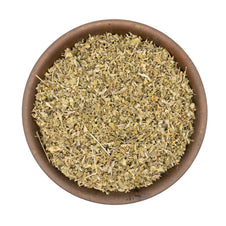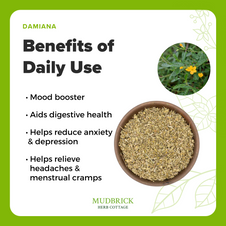



Damiana
145 reviewsDamiana
145 reviews- In stock, ready to ship
- Inventory on the way
Country of Origin may differ from what is shown above.
Botanical Name: Turnera aphrodisiaca
A member of the Passifloraceae plant family, Damiana originates from Mexico and was a popular aphrodisiac amongst the Mayans. This small shrub has aromatic yellow flowers with a spice-like fragrance.
A well-known herbal high, the leaves of Damiana, packed with essential oils, as well as essential fatty acids and some caffeine in the stems, are used in a variety of medicinal remedies and herbal damiana teas with the following benefits:
Aphrodisiac – Historically, damiana was used by the ancient Mayans as a treatment for sexually related problems, including fertility and impotence and to increase sexual desire.
Antidepressant – Research has shown that damiana is a natural antidepressant and can help fight against anxiety.
Stimulant – Damiana taken as a refresher tonic has been known to revolutionise people lives, invigorating their well-being and nervous system.
Diuretic – Damiana’s cleansing abilities also make it a perfect remedy used to treat against urinary tract infections, cystitis, urethritis.
Laxative – Acting as a mild laxative, damiana can be taken as a relief from constipation.
Antitussive - Eucalyptol, found in damiana, is an ingredient found in many cough suppressants and the herb has traditionally been taken for this purpose
Analgesic – Damiana has been used throughout history as an effective pain relief, for symptoms including headaches and menstrual cramps.
Culinary
Although not commonly used for its culinary purposes, Damiana is sometimes used as a flavouring to cordials and liqueurs.
Uses and Preparations
Infusion: An infused damiana loose leaf tea is one of the most popular and easiest ways to enjoy the wide array of benefits this herb has to offer. To enjoy a daily cup of Damiana tea, infuse 1 - 2 teaspoons of dried damiana leaves in approx. one cup of boiling water for up to 20 minutes. Add honey to sweeten if required.
Tincture: A Damiana tincture stores well and makes it a convenient alternative to an infused herbal tea.
Infused oil: A concentrated Damiana infused oil can be used in food preparation. With a flavour similar to that of chamomile, incorporating Damiana in the form of an infused oil as a convenient way to benefit from the medicinal qualities of this herb.
Poultice: Warmed damiana leaves can be applied to joints and other areas of the body in the form of a poultice to aid as pain relief.
Soups and smoothies: The easiest way to add damiana to soups and smoothies is to finely chop or blend the dried leaves or to add the herb in the form of an infused oil.
Precautions
In small doses, there are no known negative side-effects when taking Damiana.
Always consult your doctor before taking damiana if you are pregnant or breastfeeding, diabetic or within two weeks of scheduled surgery.
All information provided on this website is for informational purposes only. Please seek professional advice before commencing any treatment.













